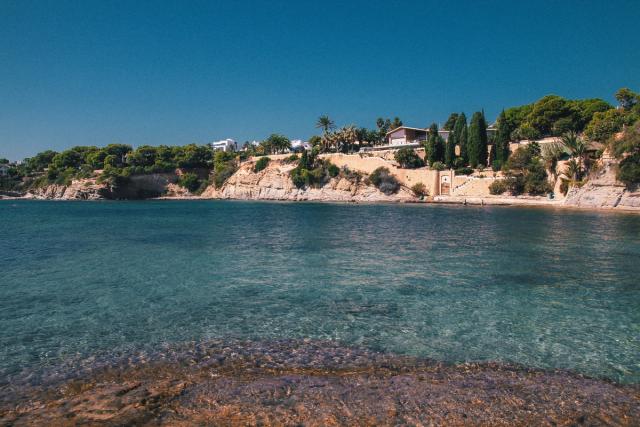Retiring Overseas: A Guide to the Top Countries
Paul Reilly
Chief Commercial Officer
Asking yourself ‘can I retire abroad?’ or wondering which countries are the best to retire to? You’re not alone. This popular lifestyle choice sees an estimated 1.3 million British expats living in Europe, with around 200,000 to 250,000 of these being retired.
Much of the appeal of retirement abroad for UK citizens lies in the promise of cheaper living costs, sunnier climes and waking up to an idyllic setting every single day. There are a wide range of other benefits too, such as affordable, top quality health insurance, financial stability and the appeal of a new adventure.
However, many people can be put off by the logistics of retiring abroad and are unsure how to retire abroad cheaply. From initial questions about renting abroad in retirement or buying a house overseas, to the longer term management of day-to-day living and accessing UK pensions, there’s plenty to take into consideration.
We’re here to help make your dream overseas retirement a reality, and in this guide, we’ll cover the specifics of retiring abroad from the UK with a pension. Keep reading to discover affordable places to retire abroad and what will happen to your nest egg once you make the move.
The best places to retire abroad
Spain

One of the best places to retire abroad is Spain, already home to around 120,000 retired Brits. The country will tempt you with its relaxed way of life, where on any given day you can explore its rich history, soak up the beautiful weather, tuck into mouth-watering cuisine, play on top-class golf courses – the list goes on. Spain is a great option if you’re looking to retire abroad on a budget, as the cost of living is almost 20% cheaper than in the UK.
France

With scenic countryside, historic city centres, a spectacular south coast, and a global reputation for quality food and drink, France is another top destination for retiring abroad from the UK. Ideal for expats to retire, live and invest overseas, France has a stable property market offering lower property prices, reduced interest rates and ample opportunities to negotiate a deal on your perfect property.
Panama

If you love the outdoors and want to be in close proximity to the United States, make Panama in Latin America your go-to retirement destination. For 11 years running, Panama has topped International Living's Annual Global Retirement Index. It’s one of the best countries to retire abroad due to its excellent healthcare, low crime rate and abundance of national parks. As one of the most inexpensive places to retire overseas, the cost of living is low and you can manage on as little as $500 a month. While it may be tempting to retire abroad cheaply, we recommend a rough budget of $2,000 a month for a higher standard of living.
Portugal

Looking for welcoming retirement villages abroad? In Portugal, you’re guaranteed to find one with a thriving local atmosphere – take your pick from peaceful countryside, laid-back coastal town or vibrant city. Portugal is one of the best places to retire abroad on a budget – it’s 30% cheaper than the UK and the cost of consumer goods is significantly lower than in the rest of Europe.
Italy

There are countless reasons to visit Italy and it’s been ranked one of the top places to retire abroad thanks to its culture at every corner, excellent public transport system and above average healthcare. Wondering where to retire abroad in Italy? Italy Magazine recommends Lombardy, Sicily, Puglia, Lazio and Tuscany.
What types of pension do you have?
Depending on your circumstances, your pension options can vary considerably. Before you think too deeply about living abroad after retirement, you’ll first need to know what you qualify for and how that may affect your finances.
UK State Pension
If you qualify for a state pension, which takes into account your National Insurance record up to when the new state pension was introduced in 2016, as well as contributions and credit since then, you can claim it no matter where in the world you live. Your pension payments will only increase in line with the UK if you live in the European Economic Area (EEA), Gibraltar, Switzerland or a country that has a social security agreement with the UK.
You can set your pension to be paid every four or 13 weeks (unless it’s less than £5 a week, in which case it arrives annually in December) and choose to have it paid directly into an overseas account in the local currency or into your UK account. Both of these options leave you open to inflated exchange rates and potentially hidden charges in order to get them into your overseas bank account, so using a dedicated currency specialist is the best option.
Multiple country state pensions
If you’ve been living and working abroad in one country before your retirement, you may be eligible to get a pension there as well as from the UK. As with the UK, it will depend on the number of years you’ve worked in each country and their own rules around pension allocation, so you’ll need to speak to the pension service in the relevant country to find out more. If you’ve been working within the European Economic Area (EEA), Gibraltar, Switzerland or a country that has a social security agreement with the UK, you may be able to use this time to contribute towards the mandatory ten-year pension qualification in the UK.
For example, if you have only seven qualifying years from working in the UK on your National Insurance contributions, but have 15 years working in an EEA country where you contributed to the state pension there, you would meet the minimum requirement to qualify for a UK state pension – although it would only be calculated from the seven years you contributed in the UK.
Private pension
Typically, any private pension you have set up will be paid into your UK bank account, leaving you to choose how and where to spend it. As always, relying on your bank to transfer your funds overseas is a costly mistake to make – and gets more expensive the bigger your pension – so your best bet is to use a foreign exchange specialist to maximise that precious income.
One of the big problems with regular payments is your long-term exposure to currency fluctuations, which can have a huge impact on the real-world money you receive in your country of choice month on month. We can help with long-term strategies to mitigate currency risk, including setting up a forward contract, allowing you to lock in a favourable exchange rate for a transaction up to a year ahead.
What happens to my pension and benefits if I move abroad?
You can get your State Pension in any country in the world, but you must alert the Department for Work and Pensions of your move (DWP). You can get pension increases yearly if you live in a European Economic Area (EEA) country or a country which has a social security agreement with the UK. Alternatively, your pension could be frozen or linked to the cost of living.
Similarly, your entitlement to benefits abroad depends on where you’re retiring to. If you're retiring abroad from Ireland and already claiming benefits, you must tell your local Jobs and Benefits office that you're moving abroad. Double check the social security agreement with the country you’re moving to and if you’re eligible to claim benefits there.
Tax laws vary from country to country and as part of living abroad in retirement, you may still have to pay UK tax. You’ll want to alert HMRC that you’re moving abroad to ensure you pay the right amount of tax.
Does retiring early affect your overseas pension opportunities?
Potentially, yes. Retiring early and moving abroad means you will have some decisions to make around how you treat your pension. First and foremost is whether you want to try and take your entire pension fund overseas using the Qualifying Recognised Overseas Pension Scheme (QROPS), which can be in the country you’re retiring to or another offshore location. Qualify and you may find more agreeable tax rates on your QROPS income than you’d find in the UK. You’ll also no longer be subject to a maximum lifetime allowance or UK inheritance tax (although your beneficiaries may be).
Another factor to bear in mind is whether you want to take a lump sum from your pension fund when you first retire. In the UK you can secure up to 25% without paying tax, but that’s not always the case in other countries. France and Spain, for example, will both tax any lump sum you take out of your pension pot if it’s based there, meaning it might be wiser to leave it invested or withdraw it beforehand and use a currency specialist to transfer it to your currency of choice.
Five steps to minimise your overseas retirement costs
Now you know the top places to retire overseas and how much money you need to retire abroad, it’s time to plan your currency exchange. For one-off transactions such as when you’re on holiday, you might opt to use a bank or your credit card, and accept the poor exchange rate and bank charges.
However, when it comes to bigger, or more regular exchanges, from your mortgage or rent payments through to healthcare costs, transport and groceries, these costs can quickly have a considerable impact on your day-to-day budget. For affordable retirement abroad, it’s important to plan for currency risk and know how to make the most cost-efficient pension transfers.
By signing up to an account with Clear Currency, you can make same-day transfers on our easy-to-use, secure online platform. We offer bank-beating exchange rates and can help you cut through some of the currency jargon. We are also regulated by the Financial Conduct Authority, which means we have to comply with their strict set of standards.
In five simple steps, you can sign up for a free, no-obligation account with us.
1. Sign up to Clear Currency
Complete a quick online form telling us what your needs are and we’ll open an account for you, assigning a dedicated foreign exchange specialist from our team.
2. Set your rate
A member of the team will walk you through how the exchange process works, answer your questions and discuss how best to meet your needs and get the best rates for the currency you’re buying. You can do this over the phone or via our online platform.
3. Transfer your funds
Once you’re happy with the exchange rate and quote, transfer your funds to your account for us to convert into the currency you want.
4. Access your new currency
We will send the converted currency to the overseas account you nominate – and then send you an email confirming everything.
5. Complete your purchase
With the money in your overseas account, you can allocate your pension safely in the knowledge you’ve made the most of your funds.
If you’re not quite ready to open an account but have some starter questions about currency exchange, you can call 020 7151 4832, or email hello@clearcurrency.co.uk.
Clear Currency can help make your overseas retirement easier
To make the most of every pension payment, simply sign up for a free account. It only takes a minute or two and then we’ll get in touch to talk over exactly what you need and how we can help you keep more of your money when you transfer with us.
Related Articles
How to Mitigate Foreign Exchange Risk
Currency risk can have a significant effect on the efficiency and profitability of any international business. Each exchange rate movement affects how much you receive from sales and what you pay to suppliers.
Read more
Moving to Dubai from the UK: Checklist
You’re ready for a new life overseas and have decided you’re moving to Dubai. Now it’s time to consider the various costs involved, from your visa and accommodation, to health insurance, shipping your belongings and bringing your beloved pets along too.
Read more
Currency Outlook Quarter 1 2023
Clear Currency looks back at the performance of the US dollar, euro and sterling in Q4 2022, and assesses what might be in store for Q1 2023.
Read more



